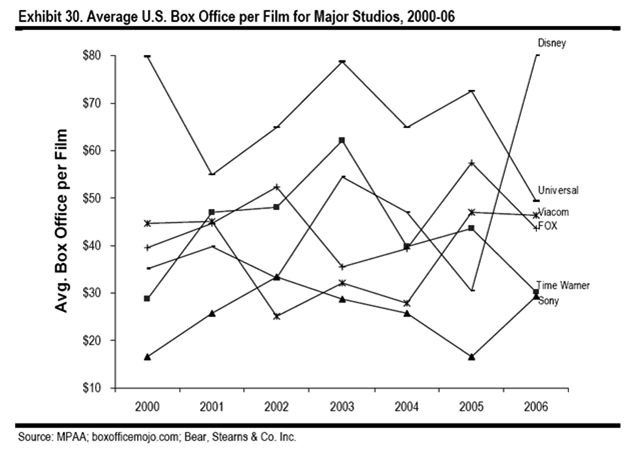
The lesson of the chaotic chart above, as Cory Doctorow of Boing Boing
observes, is that Hollywood studio executives could make equally
rational choices about what movies to make simply by rolling
dice. They have no consistently reliable knowledge or instincts about what
audiences want to see.
A relevant list
of box office earnings over the years expressed in real dollar amounts
shows only one film made in the last quarter century among the top ten
— Titanic. That's doubly instructive since Titanic,
a film about commitment and female empowerment cast in the terms of a
Victorian melodrama, violates almost every tenet of the current
Hollywood wisdom about “what audiences want”.
What's going on here? Hollywood executives aren't stupid, the
corporations who employ them are presumably interested in serving their
market. I think that Hollywood has simply given up. It
senses that it will not be part of the future of entertainment but it
lacks the energy to remake itself for a new age. Executives are
interested in making as much money as possible in the short term by
releasing the safest product they can imagine using the outdated
paradigms and then retiring in style. After all, if all your
peers in the industry are just as clueless as you are, as the chart
above seems to indicate, then you have no real competition. What
incentive do you have for taking chances?

[Note: The Birth Of A Nation
almost certainly belongs in the list of the top 100 box office champs
linked above but at this point there's no way of ascertaining exactly
how much money it made. The film was released in most parts of
the country on a “states' rights” basis, which meant that a distributor
bought the right to exhibit the film in a certain territory for a fixed
sum and then kept whatever profits he earned himself, with no
obligation to report them to anyone else. Louis B. Mayer made his
first fortune distributing the film in New England — then helped
create the Hollywood cartel which virtually monopolized film
distribution in America, assuring that no new entrepreneurs could ever
again make money the way he did when he was starting out. This
illustrates the basic principle of American corporate capitalism —
“Free market for me, rigged market for you.”]
